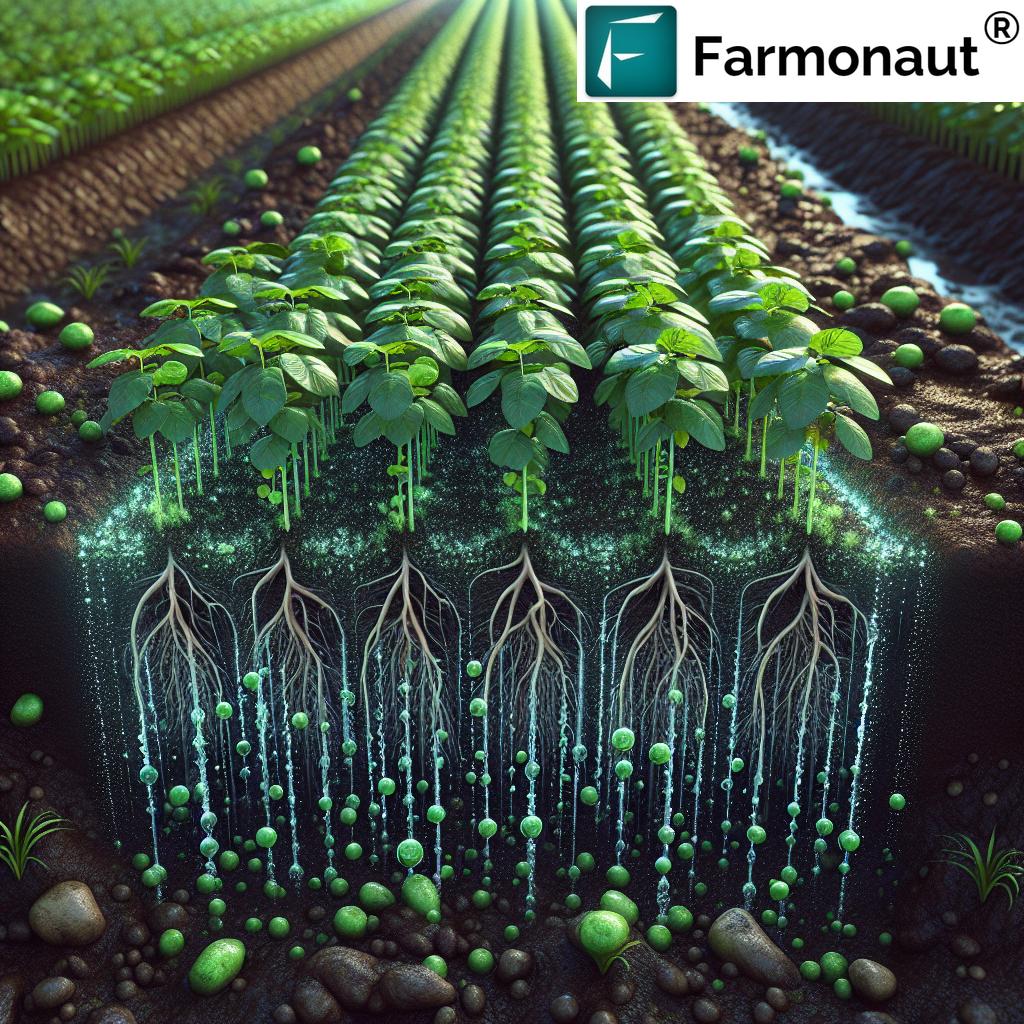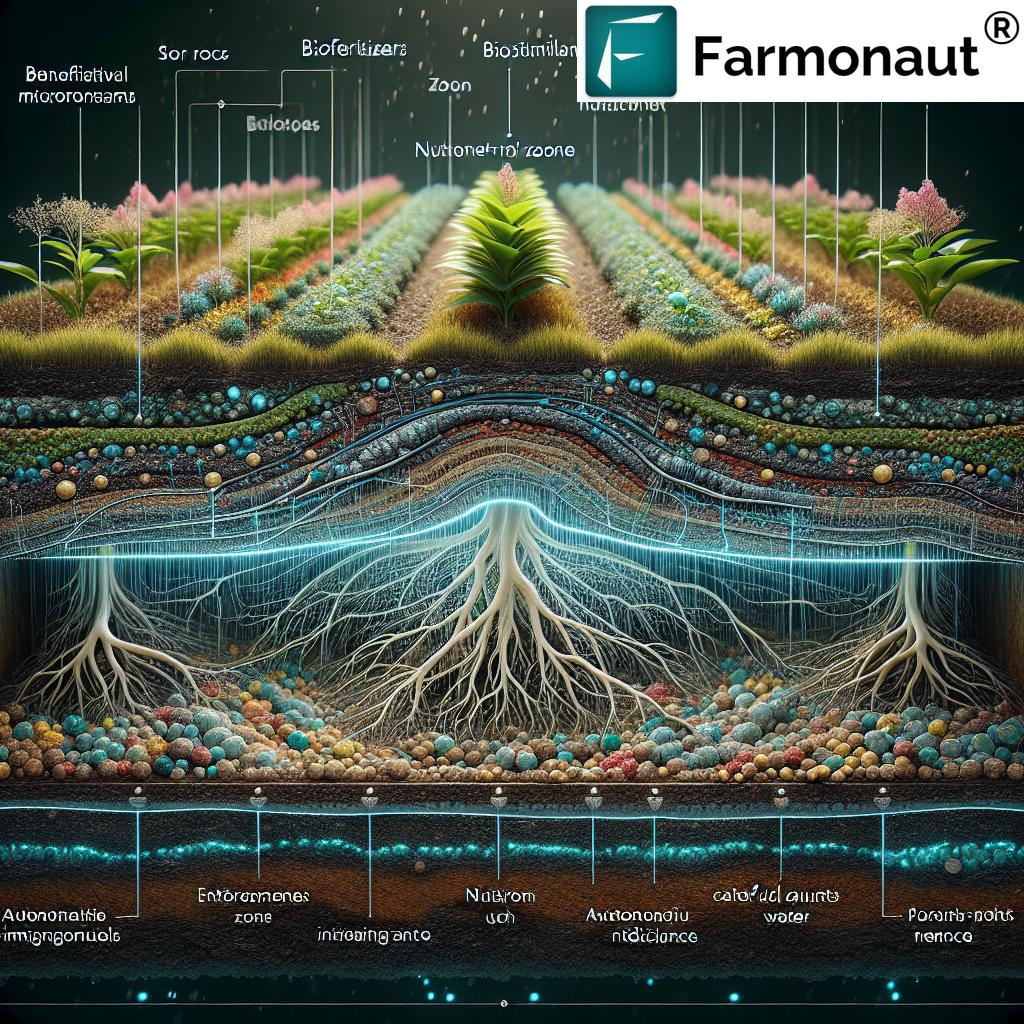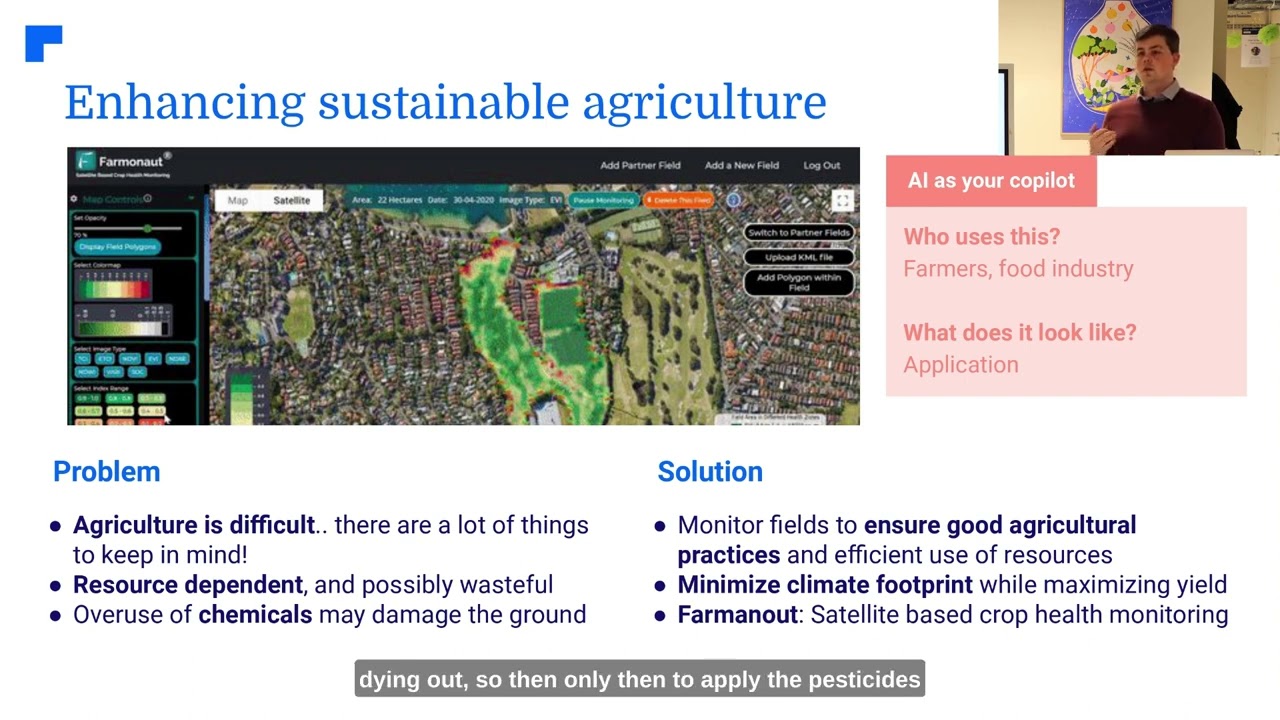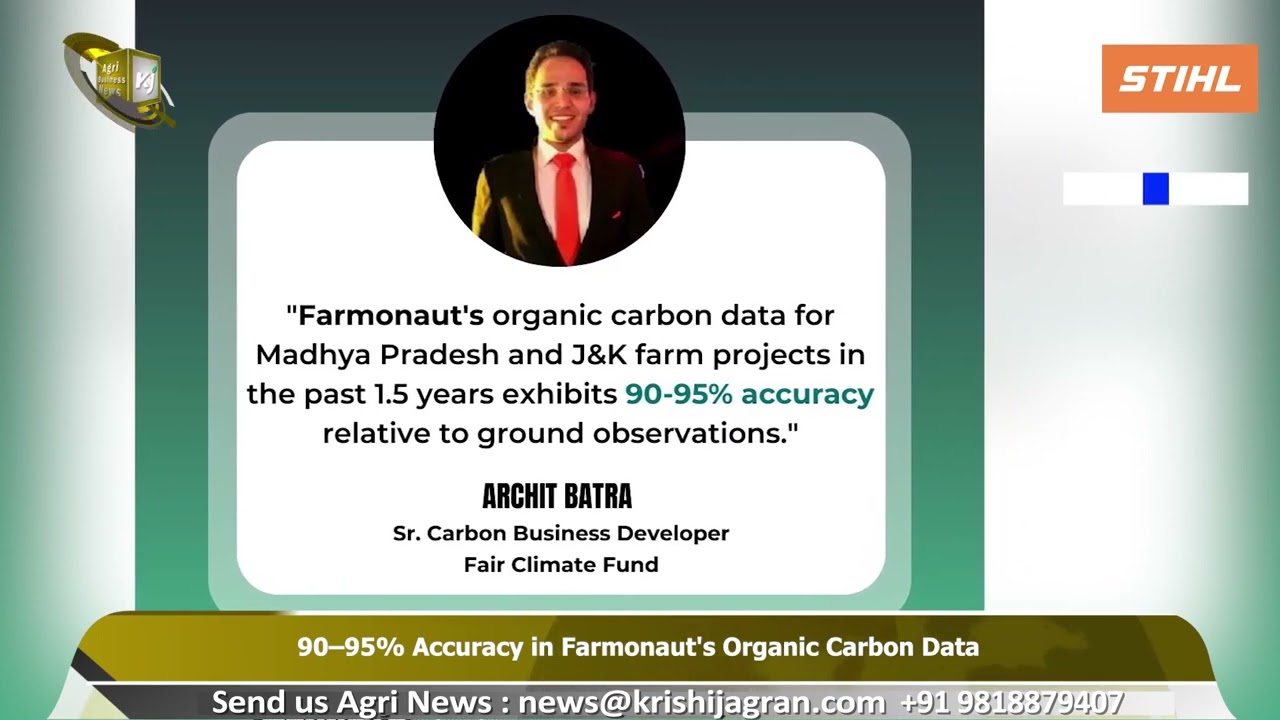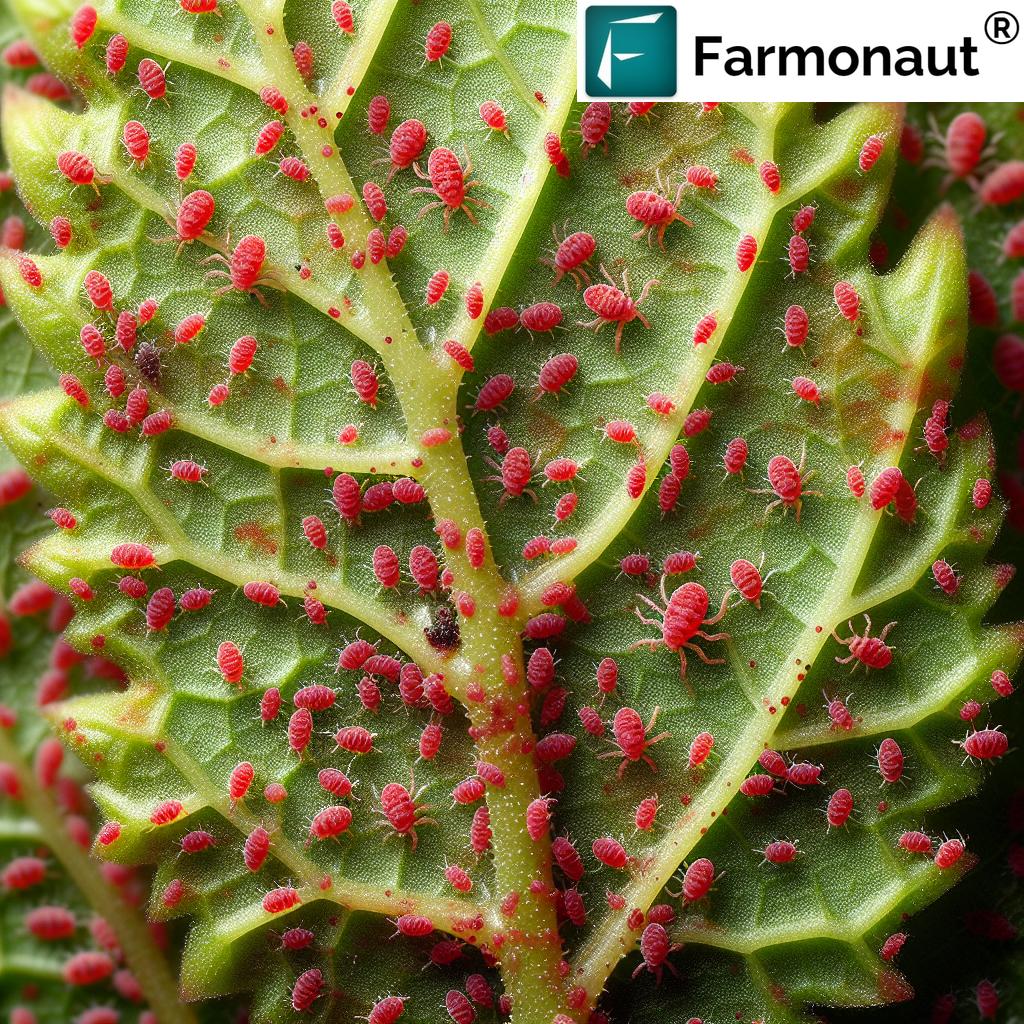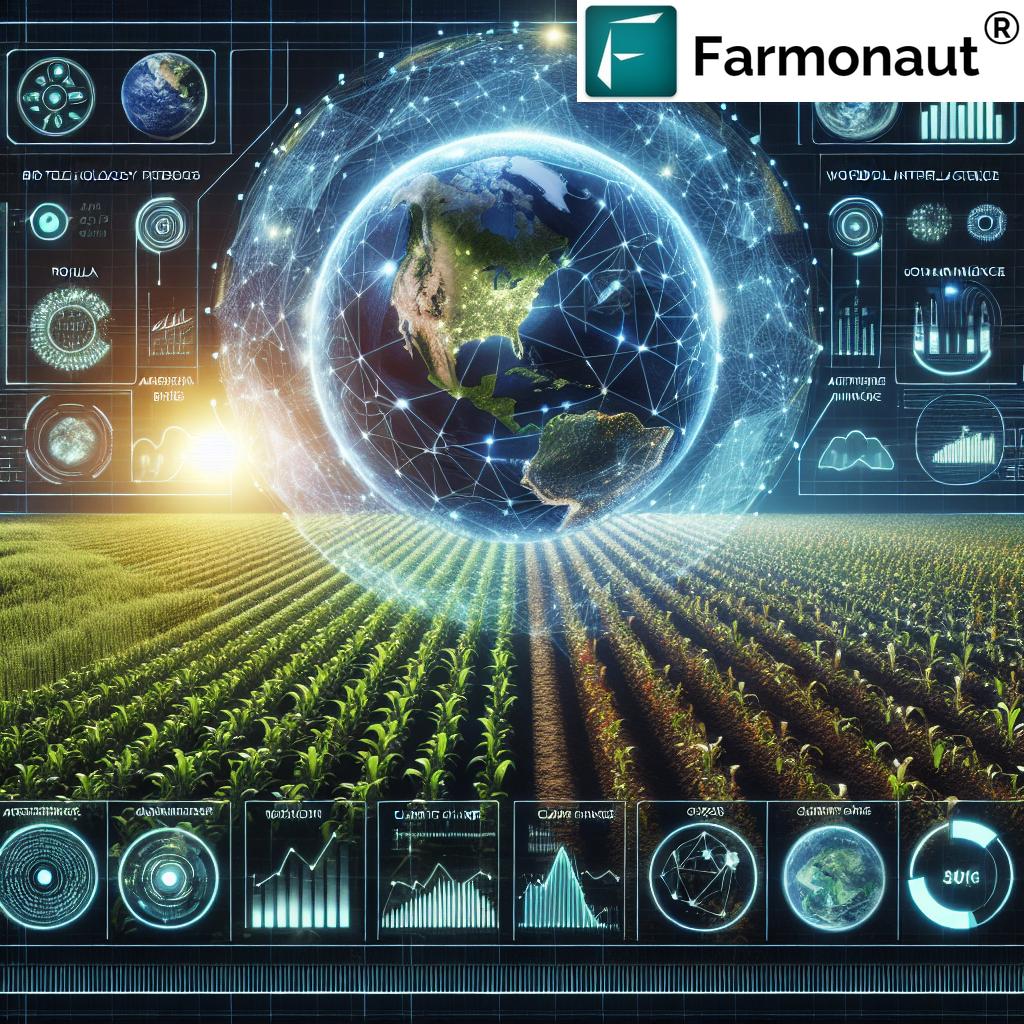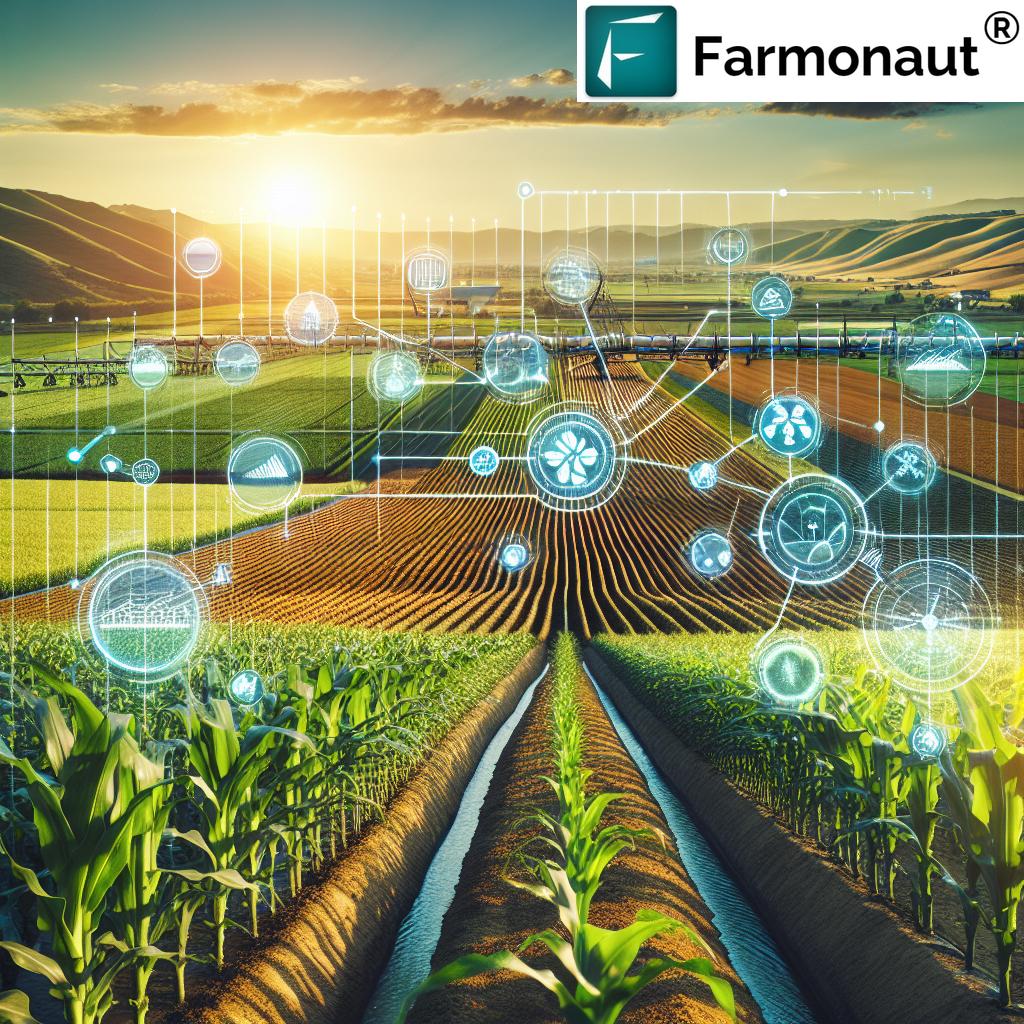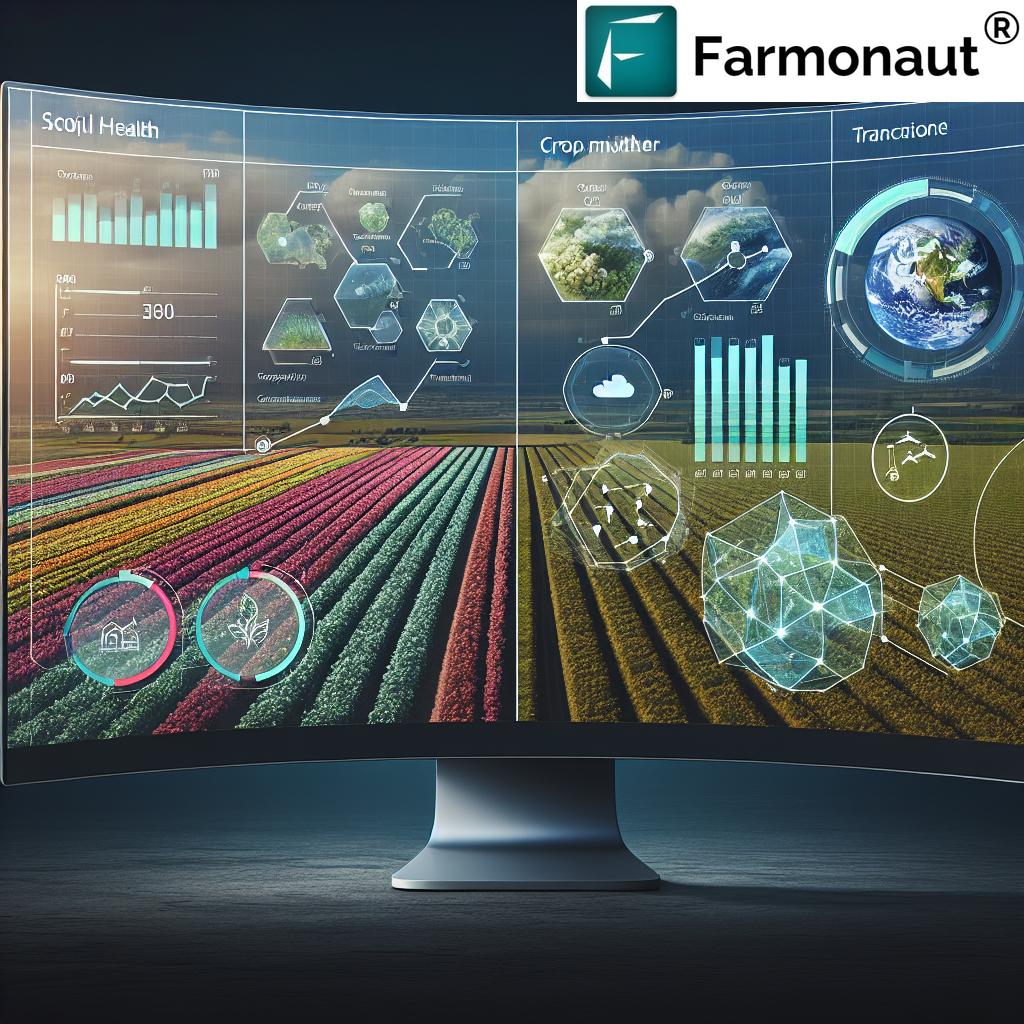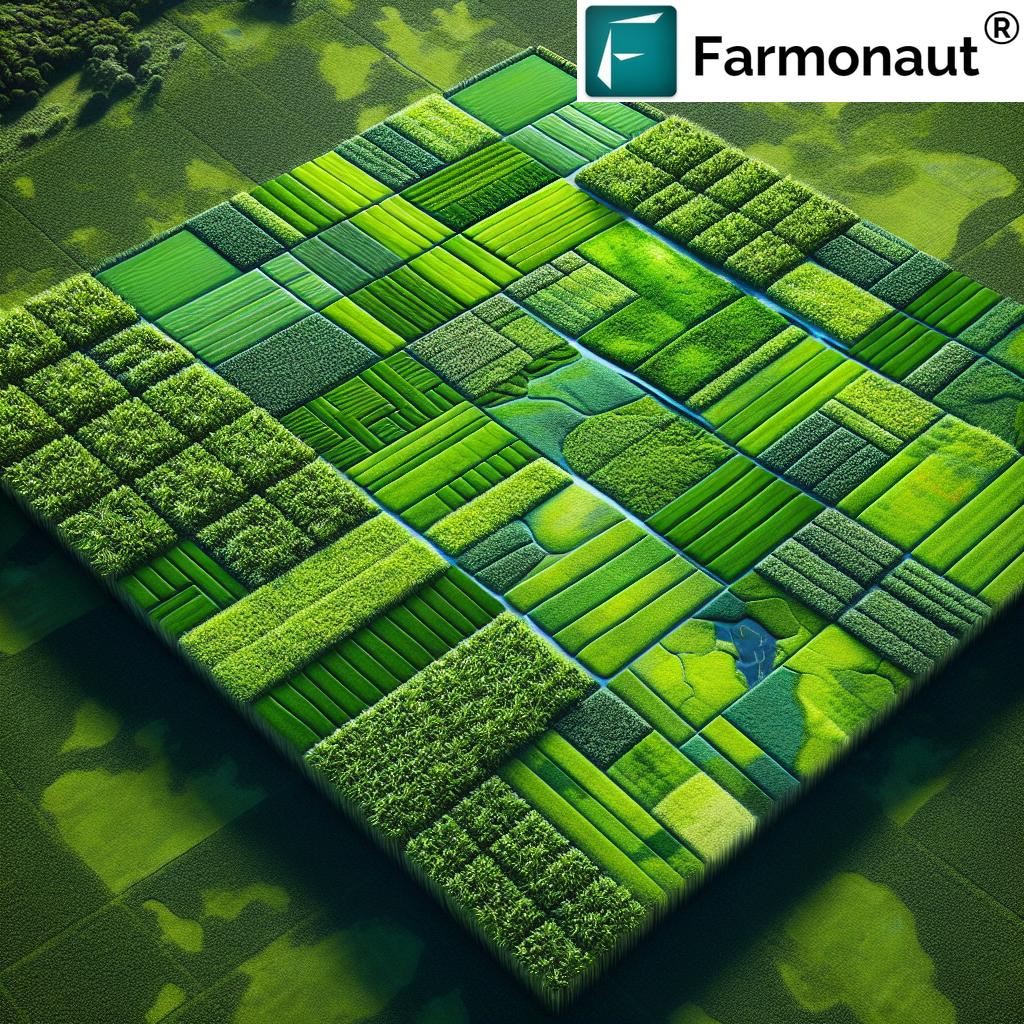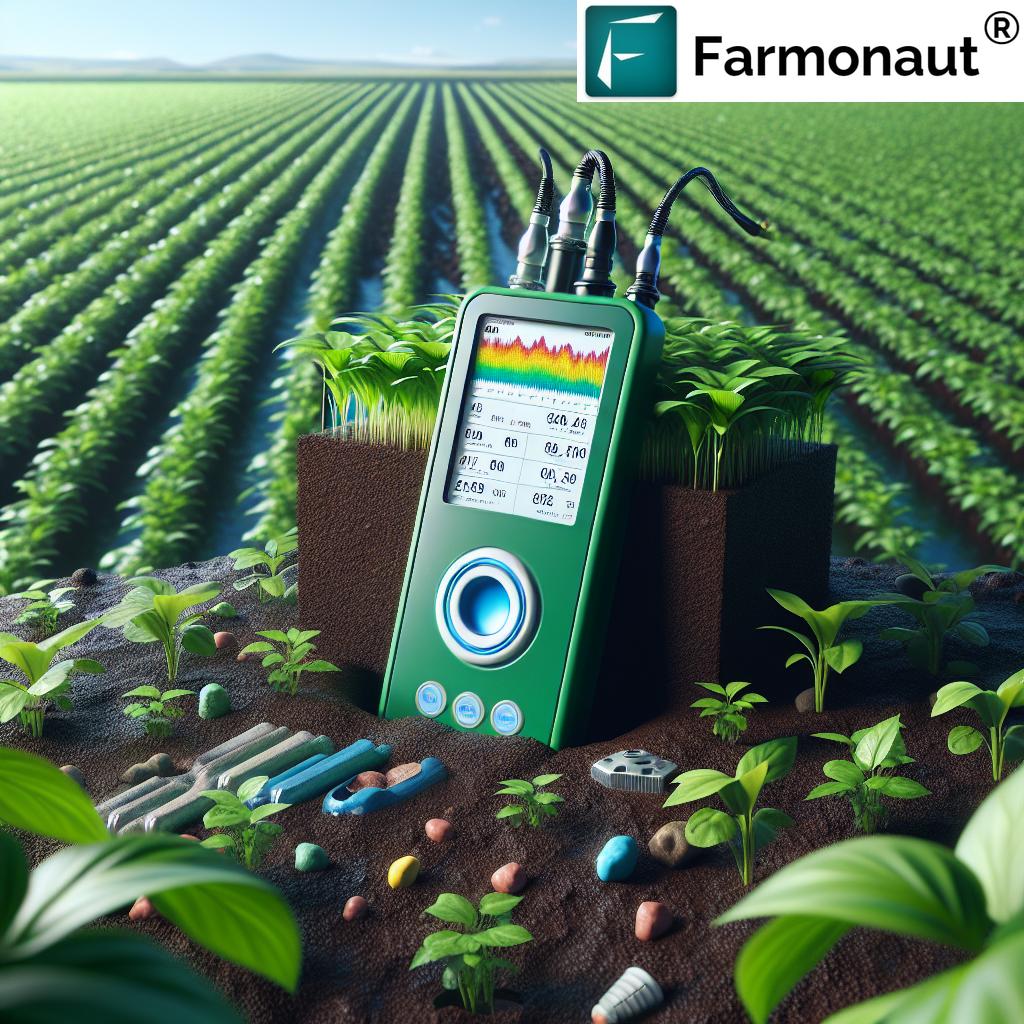Advanced Soil: 7 Soil Health Enhancers for High Yields
Welcome to our in-depth guide on advanced soil health enhancers, the linchpin for sustainable agriculture practices, higher yields, and environmental resilience. As farming, agriculture, and forestry continuously evolve, innovative solutions like biochar, biofertilizers, biostimulants, smart irrigation systems, and nanotechnology in farming are transforming the way we nurture our soils for future-ready productivity.
“Biochar can increase soil water retention by up to 37%, boosting crop yields in advanced agricultural systems.”
- Introduction: The Importance of Advanced Soil Health Enhancers
- 1. Biochar: Carbon-Rich Soil Amendment
- 2. Biofertilizers: Beneficial Microorganisms in Action
- 3. Biostimulants for Plant Stress Resistance
- 4. Nanotechnology in Farming: Precision Soil Management
- 5. Smart Irrigation Systems for Efficiency
- Comparison of Advanced Soil Health Enhancers
- Farmonaut: Empowering Precision and Sustainability
- FAQ: Advanced Soil Health Enhancers
- Conclusion
Introduction: The Importance of Advanced Soil Health Enhancers
Soil health forms the backbone of successful agriculture, farming, and forestry. Healthy soils are not only the foundation for robust plant growth and increased crop yields but also support biodiversity, water retention, and environmental resilience. However, modern challenges—such as soil degradation, nutrient leaching, water scarcity, and soil fatigue from overuse of synthetic fertilizers—demand innovative solutions.
The latest wave of advanced soil health enhancers bridges the gap between traditional farming practices and the imperative for efficiency, sustainability, and yield improvement. Solutions like biochar soil amendment, biofertilizers for crop growth, biostimulants for plant stress resistance, smart irrigation systems, and nanotechnology in farming are redefining soil and plant management. In this comprehensive guide, we explore each of these enhancers—their mechanisms, benefits, and real-world use in achieving sustainable, high-yielding crops.
1. Biochar: Carbon-Rich Soil Amendment
What is Biochar?
Biochar is a stable, carbon-rich soil amendment produced from pyrolyzing organic material (such as agricultural waste, wood chips, or manure) in an oxygen-limited environment. Unlike ash or compost, biochar persists in soil for hundreds of years, acting as a carbon sink that can mitigate climate change by capturing atmospheric CO₂. Its unique structure provides a host of benefits when incorporated into farming and forestry systems.
Benefits of Biochar in Farming and Agriculture
- Improved Soil Structure: Biochar increases soil porosity, enhancing root development, water infiltration, and plant anchoring.
- Enhanced Water Retention: The porous nature of biochar helps to retain water, especially important in degraded or sandy soils facing water scarcity.
- Increased Nutrient Holding Capacity: It boosts the ability of soils to hold on to essential nutrients, which minimizes leaching and extends nutrient availability for plants.
- Microbial Habitat: Serves as a home for beneficial microorganisms, nourishing the entire soil ecosystem and supporting plant health.
- Carbon Sequestration: Acts as a long-term carbon sink, not only removing CO₂ from atmospheric cycles but also mitigating climate change.
Biochar application is particularly effective in soils facing low fertility or water retention. This biochar soil amendment can reduce the need for synthetic fertilizers, providing a sustainable, environmentally friendly approach to soil improvement.
“Nanotechnology in soil enhancers can reduce fertilizer use by 30%, promoting sustainable and efficient farming.”
2. Biofertilizers: Beneficial Microorganisms in Action
How Biofertilizers Work in Sustainable Agriculture
Biofertilizers are substances containing living microorganisms, like bacteria and fungi, which colonize seeds, plant surfaces, or soil. These tiny powerhouses promote plant growth by increasing the supply or availability of essential nutrients, restoring the natural soil nutrient cycle, and building organic matter.
Types and Benefits of Biofertilizers for Crop Growth
- Rhizobium: These bacteria engage in symbiosis with leguminous plants, fixing atmospheric nitrogen into forms usable by plants.
- Azotobacter & Azospirillum: Free-living nitrogen-fixing bacteria that boost growth in a wide range of crops.
- Blue-Green Algae (Cyanobacteria): Used extensively in paddy fields, fix nitrogen and improve soil fertility.
- Seaweeds: Rich in minerals and promote plant health with natural growth-enhancing compounds.
When applied to soil or directly to seeds, biofertilizers can significantly reduce the need for synthetic fertilizer use and pesticides, cutting costs for farmers while fostering sustainable agriculture practices. They are essential in promoting soil fertility and increasing cropping systems’ resilience by boosting beneficial soil biota.
3. Biostimulants for Plant Stress Resistance
Overview: Biostimulants in Crop Development and Yield Enhancement
Biostimulants are natural or synthetic substances that, when applied to soil or plants, stimulate natural processes, enhancing nutrient uptake, improving stress tolerance, and accelerating overall growth. These boosters can work through various mechanisms, primarily through enhancing soil and plant function rather than supplying nutrients directly.
Key Types and Functions
- Seaweed Extracts: Rich in bioactive compounds (polysaccharides, amino acids, vitamins, plant hormones) that improve germination, root growth, and tolerance to abiotic stresses (salinity, drought, temperature extremes).
- Amino Acids & Protein Hydrolysates: Boost nitrogen assimilation, support osmotic regulation, and mitigate plant stress by enhancing antioxidant mechanisms.
- Chitosan & Biopolymers: Strengthen plant defense systems, triggering production of proteins that defend against diseases, and increase resilience to abiotic pressures.
- Plant Extracts: Packed with phenolics, flavonoids, alkaloids, and terpenoids which act as antioxidants, protecting the plant under stressful environmental conditions and promoting faster recovery and growth.
By integrating biostimulants into crop management, farmers experience enhanced plant vigor, improved yields, and more resilient systems—key in sustainable agriculture and combating climate uncertainty.
4. Nanotechnology in Farming: Precision Soil Management
Nanotechnology in agriculture brings a new level of precision to soil management by harnessing materials and devices with nanoscale structures (one billionth of a meter). These innovative technologies serve as powerful soil health enhancers through:
- Nano fertilizers: Minimized particle size allows for improved nutrient delivery, reducing nutrient leaching, and increasing plant uptake efficiency. This leads to better nutrient retention in soil for optimal plant availability.
- Nano sensors: Tiny, intelligent devices that monitor soil pH, moisture, nutrient levels, and toxins in real-time. Immediate feedback enables precision interventions, ensuring soils remain in ideal conditions for plant growth.
Research shows nanotechnology can reduce fertilizer use by up to 30%, which not only saves costs but also promotes sustainable and efficient farming—meeting both productivity and environmental goals.
5. Smart Irrigation Systems for Efficiency
The Shift Towards Smart Irrigation
In the era of climate change and water scarcity, traditional irrigation often leads to water waste and nutrient leaching. Smart irrigation systems—powered by sensors, AI-based advisories, and real-time data—are revolutionizing farming practices worldwide.
Key Features of Smart Irrigation Systems
- Real-Time Monitoring: Soil moisture, temperature, weather, and crop-specific water demand are tracked and relayed instantly to farm operators.
- Automatic Adjustments: Systems respond instantly to changes in soil and atmospheric conditions, optimizing water and nutrient delivery.
- Water & Fertilizer Conservation: Reduce nutrient leaching and water loss by improving application timing & precision. Water usage can drop by up to 30%, supporting more sustainable, cost-effective farming.
- Integration with Drones and Cloud Data: For even greater accuracy and administrative ease, smart systems increasingly utilize cloud connectivity and aerial sensing.
By embracing smart irrigation, farmers can prevent over-irrigation, boost yields, and conserve both water and nutrients—positioning their operations as resilient and sustainable into the future.
Comparison of Advanced Soil Health Enhancers
| Enhancer Type | Description | Main Benefits | Estimated Yield Improvement (%) | Application Method | Sustainability Impact |
|---|---|---|---|---|---|
| Biochar | Carbon-rich amendment produced by pyrolyzing organic material | Improves soil structure, water retention, nutrient holding, carbon sequestration | 10–25% | Incorporated into soil; blended before planting | High (long-term carbon sink, reduced fertilizer need) |
| Biofertilizers | Living microorganisms (e.g., Rhizobium, Azotobacter, Cyanobacteria) | Boost nitrogen fixation, restore nutrient cycling, increase plant vigor | 8–15% | Seed coating, soil application, root dip | High (reduces synthetic fertilizer use, improves soil health) |
| Biostimulants | Natural/synthetic substances (e.g., seaweed extracts, amino acids) | Enhances nutrient uptake, boosts stress resistance, stimulates root growth | 5–12% | Foliar spray, seed treatment, soil drench | Medium to High (eco-friendly, boosts resilience) |
| Smart Irrigation | Automated water delivery systems using sensors and AI | Prevents over-irrigation, reduces nutrient leaching, conserves water | 7–18% | Automated drip, sprinkler, or center pivot | High (water savings, reduced energy, improved yields) |
| Nanotechnology | Nano fertilizers and nano sensors for precision management | Enhances nutrient retention, real-time monitoring, reduces losses | 8–22% | Seed/soil application, in-field sensor deployment | High (efficiency, reduced inputs, environmental safety) |
Farmonaut: Empowering Precision and Sustainability
At Farmonaut, we believe that advanced soil health management is the cornerstone of sustainable agriculture. By harnessing satellite technology, AI, and blockchain, we empower farmers with precise, actionable insights for their land—enabling them to implement advanced soil health enhancers more efficiently than ever before.
- Real-Time Crop Monitoring: Our multispectral satellite imagery delivers near-instant data on crop health, soil moisture, and overall field conditions. This lets farmers take targeted action to optimize irrigation and fertilizer management, ensuring nutrients remain available for longer and water retention in soil is maximized.
- AI-Based Advisory (Jeevn AI): We offer tailored, expert recommendations for irrigation, nutrient management, and pest control—promoting sustainable agriculture practices that minimize environmental impact while maximizing yields.
- Blockchain-Based Traceability Solutions: Our traceability system enables secure, transparent supply chains—for example, by tracking farm inputs and produce origins from field to consumer. Learn more about product traceability!
- Fleet & Resource Management: Optimize logistics and resource deployment at any scale—fleet management ensures every machine and labor input supports your crop yield and sustainability goals.
- Large Scale Farm Management: With the large-scale farm management platform, agricultural operations of any size can track, organize, and analyze farm data for better resource allocation and long-term soil health.
- Carbon Footprinting: Our carbon footprinting feature helps agribusinesses and farmers understand and reduce emissions, supporting compliance and environmental resilience.
- Crop Loan & Insurance Support: Through satellite-based crop verification, we provide essential data for banks and insurers to securely process farmer loans and insurance claims.
For developers and agritech enterprises, our API and API Developer Docs offer the tools you need to leverage satellite and weather data in your own solutions.
FAQ: Advanced Soil Health Enhancers
What are the top soil health enhancers for high yields?
- Biochar: Improves water retention, soil structure, and nutrient holding capacity.
- Biofertilizers: Harness beneficial microorganisms to boost nutrient cycling and plant health.
- Biostimulants: Enhance plant growth and resilience to abiotic stress.
- Smart Irrigation: Cuts water and fertilizer waste, supports optimal plant growth.
- Nanotechnology: Delivers nutrients efficiently and allows precision monitoring of soil health.
How does biochar improve water retention in soil?
Biochar’s porous structure acts like a sponge, holding more water in the soil profile. Studies show water retention can improve by up to 37%, meaning plants stay hydrated longer, especially during dry spells. This is crucial for crops in sandy or degraded soils.
What role do biofertilizers play in sustainable agriculture?
Biofertilizers introduce living, beneficial microorganisms that fix nitrogen, solubilize phosphorus, and restore soil’s natural fertility. This reduces dependence on synthetic fertilizers, leading to healthier soils and more sustainable farming ecosystems.
Are biostimulants safe for all crops?
Most biostimulants—such as seaweed extracts, amino acids, and natural plant extracts—are eco-friendly and safe for use in a wide variety of crops. Always check compatibility and recommended dosages for best results.
Can smart irrigation systems really save water and reduce leaching?
Yes. By using sensors and AI, smart irrigation systems only deliver water when, and where, it is needed. This precise approach prevents over-irrigation, reduces nutrient leaching, and conserves valuable water resources.
What is the significance of nanotechnology in farming?
Nanotechnology enables ultra-precision in both fertilizer delivery (nano fertilizers) and monitoring (nano sensors). By improving nutrient-use efficiency and providing real-time data, nanotechnology in farming supports higher yields and more sustainable resource use.
Conclusion: Building Resilient, Productive Soils for the Future
Advancements in soil health enhancers—from biochar and biofertilizers to biostimulants, smart irrigation, and nanotechnology—demonstrate that the future of agriculture is one of innovation, precision, and sustainability. By adopting these practices, farmers and stakeholders not only achieve greater yield and soil fertility, but also support the planet’s health for generations to come.
Ready to transform your agricultural operations? Experience the power of satellite-based crop and soil health monitoring on your farm today:
Monitor your soil—and your yields—the smart, sustainable way.


